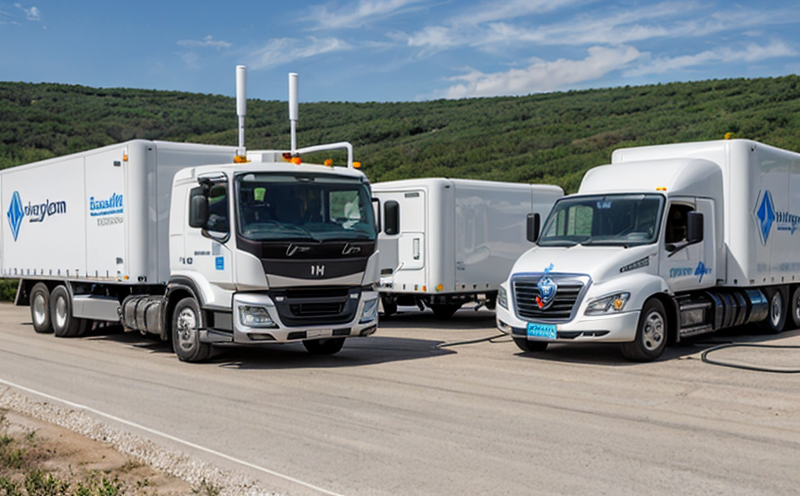SAE J2799 Hydrogen Fueling Communications Protocol Testing
The SAE J2799 standard defines a hydrogen fueling communication protocol designed to ensure seamless and secure interactions between vehicles equipped with hydrogen fueling systems and the refueling stations. This testing service is crucial for manufacturers, R&D teams, compliance officers, and quality managers in the energy sector who are involved in developing, manufacturing, or deploying hydrogen-based fueling infrastructure.
The primary focus of this testing protocol encompasses verifying that hydrogen fueling equipment adheres to the communication standards specified by SAE J2799. This ensures interoperability between different hydrogen fueling systems, which is essential for the widespread adoption and scalability of hydrogen fueling networks across various industries.
Our laboratory employs a comprehensive approach to testing this protocol using state-of-the-art equipment and methodologies that align with international standards such as ISO 14683. Our team ensures that all testing processes are conducted in strict adherence to these guidelines, guaranteeing the highest level of accuracy and reliability. This service is particularly relevant for entities involved in the development and deployment of hydrogen fueling systems, electric vehicles (EVs), and related infrastructure.
The SAE J2799 protocol addresses a range of critical parameters including data exchange between the vehicle's onboard diagnostic system and the refueling station, ensuring that all necessary information is accurately transmitted. This encompasses various aspects such as vehicle identification, fueling request initiation, status updates during the fueling process, and completion notifications.
Our testing service focuses on evaluating these key components:
- Data integrity
- Communication latency
- Error handling mechanisms
- Security features
- Compatibility with different vehicle models
- Interoperability across various fueling stations
The testing process involves a series of detailed steps to ensure comprehensive evaluation. Vehicles are first prepared by connecting them to the hydrogen refueling station, ensuring all systems are operational and ready for communication tests.
During the test procedure, our laboratory simulates various fueling scenarios to evaluate how different vehicles interact with the refueling stations under diverse conditions. This includes testing under real-world data exchange rates and environmental factors that could potentially affect performance. The results of these tests are meticulously recorded and analyzed using advanced software tools.
The output from this protocol testing is critical for identifying any discrepancies or areas requiring improvement in the fueling systems. Compliance with SAE J2799 ensures that all hydrogen refueling stations can operate efficiently, reducing operational inefficiencies and enhancing user satisfaction.
Our laboratory's expertise lies not only in conducting these tests but also in providing detailed reports that offer actionable insights for continuous improvement of hydrogen fueling systems. These reports are invaluable tools for R&D teams working on next-generation hydrogen fueling technologies.
Benefits
- Enhanced Interoperability: Ensures seamless communication between different models of hydrogen vehicles and refueling stations, promoting a more unified ecosystem.
- Improved Security: Robust security features protect against unauthorized access and data breaches, enhancing the safety of fueling operations.
- Increased Efficiency: By identifying and rectifying issues early in development, this testing service helps reduce operational inefficiencies and downtime.
- User Satisfaction: Reliable communication protocols lead to a smoother refueling experience for end-users, contributing to higher customer satisfaction levels.
Customer Impact and Satisfaction
The implementation of SAE J2799 protocol testing significantly impacts customers by fostering confidence in the reliability and safety of hydrogen fueling systems. This, in turn, enhances overall user trust and satisfaction. By ensuring that all refueling stations meet stringent communication standards, we contribute to a more robust and secure hydrogen fueling infrastructure.
For quality managers and compliance officers, this service provides peace of mind knowing their products are up-to-date with the latest industry standards. This not only aids in meeting regulatory requirements but also positions them as leaders in innovation within the hydrogen fueling sector.
Use Cases and Application Examples
| Use Case | Description |
|---|---|
| Vehicle-to-Refueling Station Communication | Evaluating the ability of vehicles to communicate with refueling stations during fueling operations. |
| Error Handling and Recovery | Testing the system's response to communication errors and ensuring it can recover seamlessly. |
| Data Security Testing | Evaluating measures implemented to protect data integrity and prevent unauthorized access. |
| Interoperability with Different Models | Ensuring that the protocol works effectively across various vehicle models from different manufacturers. |
| Environmental Factors | Evaluating performance under different environmental conditions to ensure consistent communication quality. |





